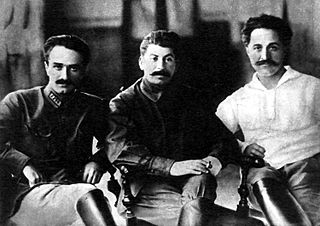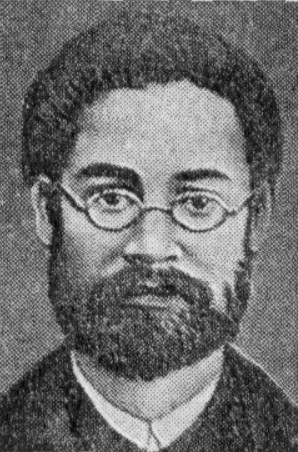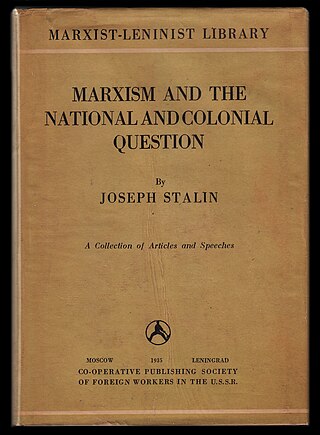Related Research Articles

Leninism is a political ideology developed by Russian Marxist revolutionary Vladimir Lenin that proposes the establishment of the dictatorship of the proletariat led by a revolutionary vanguard party as the political prelude to the establishment of communism. Lenin's ideological contributions to the Marxist ideology relate to his theories on the party, imperialism, the state, and revolution. The function of the Leninist vanguard party is to provide the working classes with the political consciousness and revolutionary leadership necessary to depose capitalism.
Marxism–Leninism is a communist ideology that became the largest faction of the communist movement in the world in the years following the October Revolution. It was the predominant ideology of most socialist governments throughout the 20th century. Developed in Russia by the Bolsheviks, it was the state ideology of the Soviet Union, Soviet satellite states in the Eastern Bloc, and various countries in the Non-Aligned Movement and Third World during the Cold War, as well as the Communist International after Bolshevisation. Today, Marxism–Leninism is the ideology of the ruling parties of China, Cuba, Laos and Vietnam, as well as many other Communist parties. The state ideology of North Korea is derived from Marxism–Leninism. Marxist–Leninist states are commonly referred to as "communist states" by Western academics. Marxist–Leninists reject anarchism and left communism, as well as reformist socialism and social democracy. They oppose fascism and liberal democracy, and are self-proclaimed anti-imperialists. Marxism–Leninism holds that a two-stage communist revolution is needed to replace capitalism. A vanguard party, organized through democratic centralism, would seize power on behalf of the proletariat and establish a one-party socialist state, called the dictatorship of the proletariat. The state would control the means of production, suppress opposition, counter-revolution, and the bourgeoisie, and promote Soviet collectivism, to pave the way for an eventual communist society that would be classless and stateless.

Karl Renner was an Austrian politician and jurist of the Social Democratic Workers' Party of Austria. He is often referred to as the "Father of the Republic" because he led the first government of the Republic of German-Austria and the First Austrian Republic in 1919 and 1920, and was once again decisive in establishing the present Second Republic after the fall of Nazi Germany in 1945, becoming its first President after World War II.
National question is a term used for a variety of issues related to nationalism. It is seen especially often in socialist thought and doctrine.

The Georgian affair of 1922 was a political conflict within the Soviet leadership about the way in which social and political transformation was to be achieved in the Georgian SSR. The dispute over Georgia, which arose shortly after the forcible Sovietization of the country and peaked in the latter part of 1922, involved local Georgian Bolshevik leaders, led by Filipp Makharadze and Budu Mdivani, on one hand, and their de facto superiors from the Russian SFSR, particularly Joseph Stalin and Grigol Ordzhonikidze, on the other hand. The content of this dispute was complex, involving the Georgians' desire to preserve autonomy from Moscow and the differing interpretations of Bolshevik nationality policies, and especially those specific to Georgia. One of the main points at issue was Moscow's decision to amalgamate Georgia, Armenia and Azerbaijan into Transcaucasian SFSR, a move that was staunchly opposed by the Georgian leaders who urged for their republic a full-member status within the Soviet Union.
Zionist-Socialist Workers Party, often referred to simply as Zionist-Socialists or S.S. by their Russian initials, was a Jewish territorialist and socialist political party in the Russian Empire and Poland, that emerged from the Vozrozhdenie (Renaissance) group in 1904. The party held its founding conference in Odessa in 1905.

Vladimir Davidovich Medem, né Grinberg, was a Russian Jewish politician and ideologue of the Jewish Labour Bund. The Medem Library in Paris, the largest European Yiddish institution, bears his name.
Marxism is a method of socioeconomic analysis that originates in the works of 19th century German philosophers Karl Marx and Friedrich Engels. Marxism analyzes and critiques the development of class society and especially of capitalism as well as the role of class struggles in systemic, economic, social and political change. It frames capitalism through a paradigm of exploitation and analyzes class relations and social conflict using a materialist interpretation of historical development – materialist in the sense that the politics and ideas of an epoch are determined by the way in which material production is carried on.

Arkadi Kremer was a Russian socialist leader known as the 'Father of the Bund'. This organisation was instrumental in the development of Russian Marxism, the Jewish labour movement and Jewish nationalism.

Austromarxism was a Marxist theoretical current led by Victor Adler, Otto Bauer, Karl Renner, Max Adler and Rudolf Hilferding, members of the Social Democratic Workers' Party of Austria in Austria-Hungary and the First Austrian Republic, and later supported by Austrian-born revolutionary and assassin of the Imperial Minister-President Count von Stürgkh, Friedrich Adler. It is known for its theory of nationality and nationalism, and its attempt to conciliate it with socialism in the imperial context. More generally, the Austromarxists strove to achieve a synthesis between social democracy and revolutionary socialism. Uniquely, Austromarxists posited that class consciousness in the working class could be achieved more organically through the maintenance of national autonomy, in contrast to the internationalist perspective and the notion of the party vanguard popular in orthodox Marxist circles elsewhere in Europe.

Bundism was a secular Jewish socialist movement whose organizational manifestation was the General Jewish Labour Bund in Lithuania, Belarus, Poland, and Russia, founded in the Russian Empire in 1897.

Marxism and the National Question is a short work of Marxist theory written by Joseph Stalin in January 1913 while living in Vienna. First published as a pamphlet and frequently reprinted, the essay by the ethnic Georgian Stalin was regarded as a seminal contribution to Marxist analysis of the nature of nationality and helped to establish his reputation as an expert on the topic. Stalin would later become the first People's Commissar of Nationalities following the victory of the Bolshevik Party in the October Revolution of 1917.

Seekers of Happiness is a Soviet film from 1936 trying to attract Jews to the Jewish Autonomous Oblast (JAO) in the far east of the USSR. It is also known by its alternative name, A Greater Promise.

Julius Martov or L. Martov was a Russian politician, revolutionary and the leader of the Mensheviks, a faction of the Russian Social Democratic Labour Party (RSDLP). A close associate of Vladimir Lenin, Martov broke with him following the RSDLP ideological split, after which Lenin led the opposing faction, the Bolsheviks.

The General Jewish Labour Bund in Lithuania, Poland and Russia, generally called The Bund or the Jewish Labour Bund, was a secular Jewish socialist party initially formed in the Russian Empire and active between 1897 and 1920. In 1917 the Bund organizations in Poland seceded from the Russian Bund and created a new Polish General Jewish Labour Bund which continued to operate in Poland in the years between the two world wars. The majority faction of the Russian Bund was dissolved in 1921 and incorporated into the Communist Party. Other remnants of the Bund endured in various countries. A member of the Bund was called a Bundist.

Foundations of Leninism was a 1924 collection made by Joseph Stalin that consisted of nine lectures he delivered at Sverdlov University that year. It was published by the Soviet newspaper, Pravda.
The Armenian Social-Democratic Labour Organization, often pejoratively referred to as the Specificists, was an Armenian Marxist organization in the Russian Empire.
The National Question and Autonomy is an article by Rosa Luxemburg, one of five originally published in 1908-1909 in Przegląd Socjaldemokratyczny in Cracow. The collection included "The Polish Question at the International Congress in London"; "Foreword to the Anthology The Polish Question and the Socialist Movement"; "The National Question and Autonomy"; "There Can Be No Self-Determination Under Capitalism"; and "The Nationalities Question in the Russian Revolution."

Non-territorial autonomy is a type of autonomy, the most important feature of which is that autonomous are not population groups living in a territory with defined borders, but communities defined based on linguistic, cultural, religious or other features.
References
- ↑ Bauer, Otto (2000). Nimni, Ephraim J. (ed.). The Question of Nationalities and Social Democracy. Translated by O'Donnell, Joseph. University of Minnesota Press. p. 696. ISBN 978-0-8166-3265-7.
- ↑ All of Renner's essay is reproduced in an English translation in Nimni, Ephraim, ed. (2005). National Cultural Autonomy and its Contemporary Critics. Routledge. p. 260. ISBN 978-0-415-24964-5.
- ↑ Yiddish : Medem, V. 1943. “Di sotsial-demokratie un di natsionale frage” (1904). Vladimir Medem: Tsum tsvantsikstn yortsayt. New York: New York: Der Amerikaner Reprezentants fun Algemeynem Yidishn Arbeter-Bund (‘Bund’) in Poyln, pp. 173-219.
- ↑ Gechtman, Roni (December 2008). "National-Cultural Autonomy and 'Neutralism': Vladimir Medem's Marxist Analysis of the National Question, 1903-1920". Socialist Studies . III (1). ISSN 1918-2821. Archived from the original on 2012-02-27. Retrieved 2009-12-02.
- ↑ Plassereaud, Yves (May 2000). "Choose Your Own Nationality or The Forgotten History of Cultural Autonomy". Le Monde diplomatique . Archived from the original on 2009-05-04. Retrieved 2009-12-02.
- 1 2 3 Bill Bowring, "Burial and resurrection, Karl Renner's controversial influence on the "national question" in Russia", in Nimni, Ephraim, ed. (2005). National cultural autonomy and its contemporary critics. Routledge. p. 260. ISBN 978-0-415-24964-5.
- ↑ Stalin, Joseph (March–May 1913). Marxism and the National Question. Prosveshcheniye. Retrieved 2009-11-12– via Marxists Internet Archive.
{{cite book}}: CS1 maint: location missing publisher (link) - ↑ Lenin, Vladimir (October–December 1913). Critical Remarks on the National Question. Prosveshcheniye. Archived from the original on 2005-11-19. Retrieved 2009-11-12– via Marxists Internet Archive.
{{cite book}}: CS1 maint: location missing publisher (link) - ↑ Nin, Andrés (1935). "Austro-Marxism and the National Question (chapter in National Emancipation Movements)". Archived from the original on 2009-05-07. Retrieved 2009-11-12– via Marxists Internet Archive.
- ↑ "Law on Cultural Autonomy for National Minorities". The Estonian Institute. 1925. Archived from the original on 2010-02-12. Retrieved 2009-12-02.
- ↑ "Declaration concerning the protection of minorities in Lithuania" (PDF). League of Nations. 1922. Archived (PDF) from the original on 2016-03-20. Retrieved 2016-06-06.